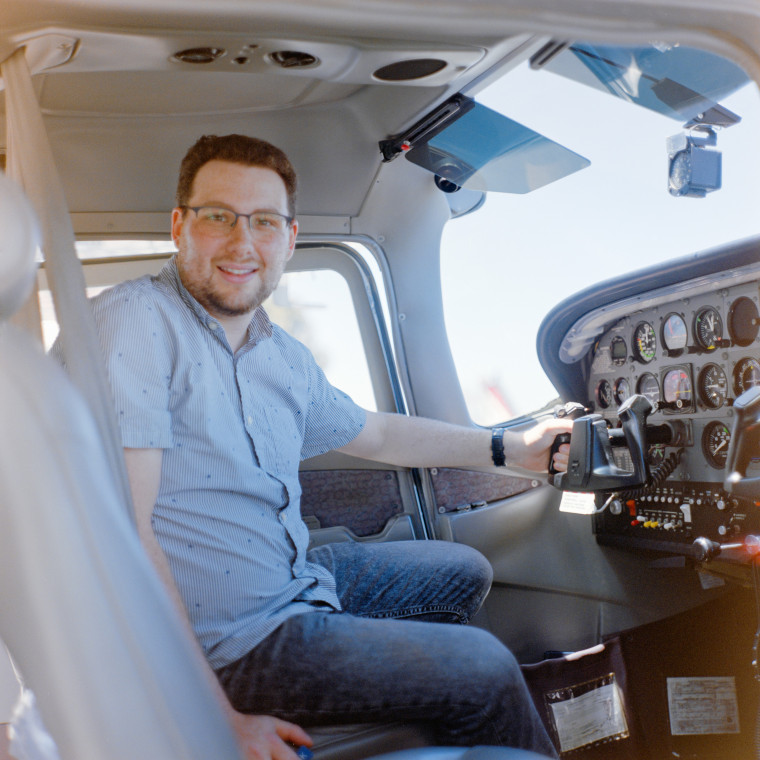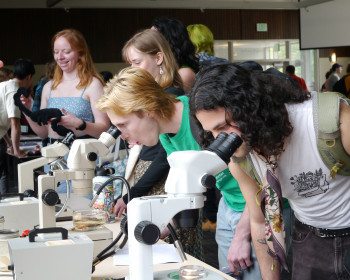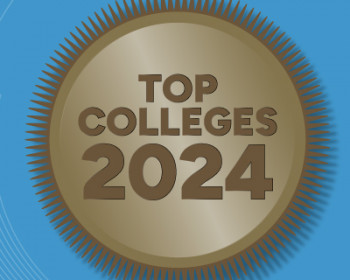Ben Glick
I’ve really enjoyed the broad variety of topics I have been able to learn and the number of projects I’ve been a part of. I’ve been able to apply the skills I developed during both of my physics and CS majors, but probably more importantly, the critical thinking skills Lewis & Clark helped me hone have come in handy.

Pronouns
Degree and Class Year
Hometown
Current City
Major
Extracurriculars
Job Title, Organization
Internship
Continuing Studies
What three words would you use to describe L&C?
What made you want to come to Lewis & Clark?
I wasn’t really sure what I was looking for when I was applying to colleges. I knew (or rather, I thought I knew) that I wanted to be an engineer after graduating, but I wasn’t sure what the right path for me to get there was. I was intrigued by the 3/2 engineering program and thought that it would provide me a good balance between liberal arts education and actually being able to get an engineering degree. Then, when I visited campus, I met Professor Steve Tufte, who showed me the physics shop and some of the recent student projects I was totally sold. Even though I ended up not pursuing engineering and actually being more interested in science, I’m really glad the physics department became my new home.
What have you been doing since graduation?
For work, I’ve been part of the operating systems group at SambaNova Systems, which is an AI chip startup in the Bay Area. I’ve really enjoyed the broad variety of topics I have been able to learn and the number of projects I’ve been a part of. I’ve been able to apply the skills I developed during both of my physics and CS majors, but probably more importantly, the critical thinking skills Lewis & Clark helped me hone have come in handy while figuring out the non-technical side of the job.
Outside of work, I’ve received my private pilot’s license and enjoy spending my weekends in the Cessna 182 or the American Champion Citabria. I’ve also gotten involved with the Palo Alto Amateur Radio Association, where I build and use radios mostly in the various HF and VHF bands, as well as working on fun software/radio related projects (shameless plug for my new project KERMIT). I’m also a half-season ticket holder at the San Jose Giants of the single-A California league, and I enjoy medium-format film photography.
How did Lewis & Clark prepare you for post-college life?
Lewis & Clark provided me with a whole bunch of deeply unique experiences. One often underappreciated aspect of Lewis & Clark is actually rooted in its so-called limitations. For example, the fact that it’s not known as a “research institution” and doesn’t have grad students (other than education and counseling) made it possible for me to design my own research with Professor Jens Mache. We worked together for 3 years and were able to publish over a dozen research items which have since received 25+ citations. Another example would be the fact that Lewis & Clark did not have an Association for Computing Machinery chapter or any research computing infrastructure when I was a freshman. Because those avenues were unexplored, I was able to learn a lot about how those kinds of things are built.
To connect all of that to the actual question, the experience of learning how to be self-motivated about the things I am passionate about has been extremely useful in my startup job. I learned how to take initiative and exercise my judgement and critical thinking skills in order to first make a plan, and then execute on that plan. While my technical skills may have been relatively weaker than some of my colleagues who came out of engineering schools, my liberal-arts skills have totally filled the gap and actually made it much easier to catch up technically.
What would you say is the most important thing you learned at Lewis & Clark?
If I had to summarize all the things I learned at Lewis & Clark into one “most important” lesson, I think it would have to be the tools I developed for how to approach a new situation. That of course entails several smaller lessons. Some of them were imparted to me by the many wonderful faculty and staff on campus while I learned others from my peers around me. A few to highlight:
- If you try something new, the worst outcome will be that you just learn something new
- You can always achieve your goals without compromising your sense of self
- You need to keep your priorities in order, so that you always know what to spend your time and energy on
- You don’t grow very much if you never leave your comfort zone
Why did you major in physics and mathematics/computer science?
For physics:
I thought I would do the 3/2 program in engineering, and basically all the physics courses for the major are required for that. But a better answer is that physics was always the science I felt most connected to. There’s something about the concept of a first-principles approach that I just fell in love with. That, and they have a pretty cool metal/wood shop.
For math/CS:
I feel like I couldn’t not major in CS of some kind, after working through high school at the Computation Institute of the University of Chicago. But it wasn’t a sense of obligation that led me that direction, it was a sense of wonder that those summers gave me. I am extremely fortunate that I found my passion for computational science during high school and college.
As for why Math/CS as opposed to just CS, that is thanks to Professor Liz Stanhope. I spent all of high school being told how bad at math I was, which really discouraged me from even taking any math more than was required by the physics major. But then during Calculus 1 with Liz, she told me how great at math I was and how I’d make a great math/CS major.
How do you stay connected to Lewis & Clark as an alum?
I continue to take care of the BLT cluster, which is a research computer used primarily by the various science departments. While I was at school, I enjoyed helping to build and later expand the BLT cluster and being a part of all the cool research (and teaching) that happened on it. Since graduating, I’ve helped students with their thesis projects, some faculty-led research projects, and a couple of classes that use the BLT for their coursework. I also engage with the students in the ACM chapter. I still keep in touch with my colleagues from the library, where I was a student worker for three years.
What was your favorite class (title and professor)? How did it expand your knowledge?
I have to offer three (as you can tell, choosing between my favorite things was not a skill that L&C helped me develop).
The first was computational physics with Mohamed Anber. It was the course during which I finally felt that I wasn’t learning to do science, but I was actually doing science. During the course, I learned to take a physical question, choose appropriate physical models or analogues to try to answer the question, then choose the right mathematical tools to make sense of those physical models, and finally how to use a computer to get us an easily understandable answer to what those mathematical tools are pointing us towards. It was extremely challenging to apply those skills to new problems, but it was equally satisfying and those kinds of skills are extremely generalizable.
The next was high performance computing and distributed systems with Professor Jens Mache. Distributed systems are my main interest within computer science, and I knew Mache’s background was in high performance computing before he switched his focus to cybersecurity. So, armed with this knowledge, I successfully convinced Jens to teach a distributed systems course (although it did take me four years to convince him). And I’m really glad I was able to do that, because that course had an important role in me getting my current job.
Finally, the third is biomedical imaging with Professor Bethe Scalettar. If I’m being honest, before I came to L&C and in particular before I took Bethe’s classical mechanics course, biomedical imaging was not at all on my radar. But after taking a course with Bethe, and getting to know her well as my advanced lab advisor, I wanted to take another of her courses. She did an incredible job of making the course digestible both to the BCMB students (who made up the majority of the class) and the few physics students who were there. Her (and Jim’s) passion for the material could not have been more evident, and it was really fun beta-testing their textbook. And of course, there is a ton of interesting physics in the course material. In particular, I found MRI to be incredibly interesting.
Where did you find your community on campus?
My community of students took me a few tries to find. The thing that finally did it was founding the school’s Association for Computing Machinery chapter. The friends I made while frantically finding guest speakers, reserving rooms, buying snacks for meetings, and organizing hackathons will stick with me for life. There is no bond like one forged in the fire of not knowing what you’re doing and having to figure it out.
I also worked in the Watzek Library’s digital initiatives department for three of my four years. Over those years I became close friends with Jeremy McWilliams (head of digital initiatives) and Parvaneh Abbaspour (data services librarian). The library became my home away from home and the people there became some of my best friends on campus.
Who was your mentor on campus? Why do you consider this person your mentor?
Again, I can’t just choose one. I am so fortunate to have found several people who cared deeply about my success and personal growth. I’ve mentioned most of them in my other answers, but I have to mention again how life-changing my work in the library with Jeremy and Parvaneh was, and I also have to mention how important both Jens and Bethe were (both academically and personally) were. I also want to thank Professor Greta Binford for helping teach me not to fear interdisciplinary work and showing me just how cool biology can be.
More Admissions Stories
Admissions is located in Frank Manor House on the Undergraduate Campus.
MSC: 32
email admissions@lclark.edu
voice 503-768-7040
fax 503-768-7055
Vice President of Admissions and Financial Aid
Eric Staab
Admissions
Lewis & Clark
615 S. Palatine Hill Road
Portland OR 97219

